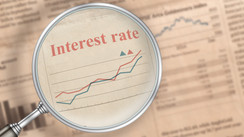As we begin a new week, crucial U.S. inflation data will take center stage as the market tries to decipher hints on the Federal Reserve's possible rate cuts. This week also continues to be packed with earnings reporting, while the pendulum of oil prices swings unpredictably. Meanwhile, the UK and Japan are expected to publish significant economic data, commanding close market scrutiny.
Tuesday's U.S. Inflation Figures In Focus
Following the recent strong performance in American job and growth data, market focus has shifted to Tuesday’s inflation report for January, which will potentially provide more clarity on the Federal Reserve’s timing for interest rate cuts. Any indication of bouncing back inflation could lead to further adjustments for rate cut predictions into the future.
Expectations from Federal Reserve Officials
Some Fed officials will also share their perspectives during the week. These include Thomas Barkin, President of Richmond Fed, Raphael Bostic, Atlanta Fed President, and San Francisco Fed Head, Mary Daly.
Consumers and Earnings this Week
The continuing earnings season also promises interesting times ahead. The S&P 500 has recently closed above 5,000 for the first time ever and Nasdaq has soared past 16,000, thanks in part to megacaps and chip stocks, along with promising earnings results. Investors will keep a close eye on reports from Shopify and Marriott, Kraft Heinz and Cisco, and Wendy’s and Trade Desk.
Volatile Oil Prices
Oil prices are expected to remain capricious this week, following a 6% weekly increase. The instability is attributed to concerns over Middle East supply issues along with U.S. refinery downtimes. However, the oil market is also vulnerable to dramatic price fluctuations based on significant news from the Middle East.
UK and Japan: Economic Data Reveal
Investors and analysts will have their eyes set on the UK’s upcoming release of jobs, inflation, and growth information. In Japan, the much-anticipated preliminary GDP data will be released, expected to show Q4 growth rebounding after a previous contraction due to inflation and slower corporate investment.





